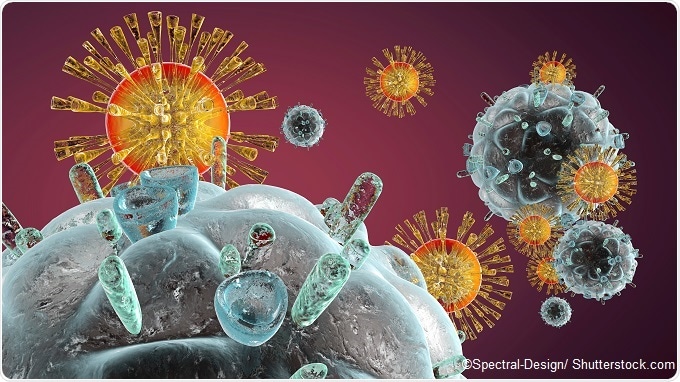Antibodies against the Human Immunodeficiency Virus (HIV) have been obtained for the first time by injecting cows with an HIV antigen. This achievement offers promise for the development of anti-HIV treatments or vaccines.
HIV is a type of retrovirus that infects vital cells in the human immune system causing HIV infection and ultimately acquired immunodeficiency syndrome (AIDS). The progressive failure of the immune system in patients with AIDS permits life-threatening opportunistic infections and cancers to thrive. There is currently no cure for HIV, but there are very effective drug treatments that enable most people with the virus to live a long and healthy life without developing AIDS.

Image: 3D illustration of immune system cells attacking a HIV virus.
Although no immunogen to date has reliably elicited broadly neutralizing antibodies (bNAbs ) to HIV in humans or animal models, bNAbs have been observed to arise naturally after around 2 years in some patients infected with HIV. The bNAbs produced by HIV patients effectively prevent most HIV strains from infecting human cells. Unfortunately, human immunization has so far failed to elicit their production.
Since it is known that the immune system of cows produces antibodies of a similar structure to the bNAbs isolated from patients with HIV, researchers injected four calves with HIV immunogens. Each calf received two injections of the immunogen and blood samples were tested for production of bNAbs to HIV. After 3550 days, all four calves had produced bNAbs to HIV.
Dr Burton, a lead author on the study and director of the NIH’s Center for HIV/AIDS Vaccine Immunology and Immunogen Discovery commented “A minority of people living with HIV produce bNAbs, but only after a significant period of infection, at which point virus in their body has already evolved to resist these defenses. The potent responses in this study are remarkable because cattle seem to produce bNAbs in a relatively short amount of time. Unlike human antibodies, cattle antibodies are more likely to bear unique features and gain an edge over complicated HIV immunogens”.
Unfortunately, it is unlikely that the bNAbs produced by cows can be used directly to treat infected patients. However, they do facilitate further research into the development of HIV treatments. Scientists are already investigating the properties of the bovine bNAbs in the hope that they can be mimicked or modified to develop a human treatment or vaccine.
Immunization of cows may thus facilitate rapid generation of antibody prophylactics and therapeutics for a range of disease-causing agents that have evolved to evade the human immune system.
Sources:
- Sok D, et al. Rapid elicitation of broadly neutralizing antibodies to HIV by immunization in cows. Nature 2017. E-pub ahead of print. Available at http://www.nature.com/nature/journal/vaap/ncurrent/full/nature23301.html?foxtrotcallback=true
- NIH News release 20 July 2017. Available at https://www.nih.gov/news-events/news-releases/nih-supported-scientists-elicit-broadly-neutralizing-antibodies-hiv-calves